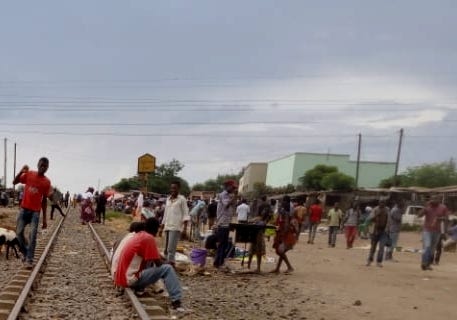Balaka's ticking bomb, as vendors encroach railway line-Louis Kumchima
So, until such a time when a fatal accident will occur, shall authorities take a tough stance against railway line vending
Ian Gomonda, 36, is sitting comfortably on a railway line that goes along Balaka Market popularly known as Panjanji, selling second-hand clothes, commonly known as Kaunjika.
Gomonda together with several other vendors plies his trade oblivious of the looming danger that may occur at any moment.
He is either busy attending to customers at the peak of business or on his phone especially Whatsapp chatting away with distant friends online, when business is slow.
Gomondas ears are usually stuck to headsets listening to music, when hes completely free from attending to customers.
Suddenly, he moves his mound of clothes to a distance responding to a slight jerking of the line which is then followed by a deafening sound of an oncoming train, which is nowhere in sight.
“I am used to this place. We alert each other when the train is approaching. The railway line jerks and we know when to move,” he says.
Gomonda is one of the vendors who complied with Balaka Town Councils’ order to stop doing business along its roads.
He says since they departed from the streets and some undesignated places in the town, the business has gone down drastically.
According to Gomonda, with the councils order, most of the vendors were forced to ply their trade along the railway line, admitting that the practice is very risky.
“We feel betrayed and neglected. Our safety is compromised. We are operating our trade on a death trap.
“How can the council kick us out of the streets when they don’t have alternative places for us to conduct our businesses,” queries Gomonda.
Agnes Magombo, who sells green maize, shares Gomondas concerns, saying conducting business on the railway line is always at owners’ risk.
Magombo adds that issues of sanitation and hygiene are also critical at the place as public toilets are located at a distance, forcing people to relieve themselves at any convenient place around.
“We normally pack our merchandise and move away from the railway line, paving way for the locomotives. Our business comes to a total standstill as it takes time for all the bogs to pass through,” Magombo states.
“I wish the council could consider providing us an alternative place for a market,” pleads Magombo.
She says despite paying market fees on a daily basis, the council fails to provide amenities to meet the demands and needs of the residents.
“Cholera can break out at this place. There is nothing to show for in terms of hygiene,” she says, adding that the council does not collect and clear garbage from the make-shift railway line market.
Traditional Authority (T/A) Nsamala of Balaka district in whose jurisdiction this illegal market is located and a good part of the railway line snakes through, describes the market as a ticking bomb.
“I don’t really know what we are waiting for to provide these people with a better and safer place for a market. The vendors deserve better; we are definitely waiting for a fatality in the near future,” T/A Nsamala envisions.
The traditional leader says he was not part of the meeting which made the decision to take out the vendors from the streets and relocated them along the railway line.
He says conducting businesses along the railway line does not only endanger vendors’ lives but also promotes theft and vandalism of railway line materials.
Nevertheless, Nsamala says together with other chiefs, they have been working tirelessly with security agencies including Central East African Railways (CEAR) Company Limited to dissuade their subjects from conducting any activity including doing business along the railway line.
“We’ve on several occasions agreed during council meetings to relocate the vendors to designated places for their businesses. To my surprise, I only saw the vendors occupying areas along the line, whereby some even erected benches, others selling their merchandise right on the line. I am not sure as to who gave them the approval,” Nsamala says.
Public Relations Officer for CEAR, Chisomo Mwamadi admits that encroachment of the railway line has fatal consequences.
Mwamadi says CEAR has been engaging communities from time to time asking them to stay away from the line for the safety of CEAR and that of the concerned communities.
“We have on several occasions engaged the council to establish why they allow vendors to ply their businesses along the line and a letter was issued on the same. But there is no compliance,” Mwamadi laments.
On the other hand, spokesperson for Balaka District Council, Mary Makhiringa says removing vendors from the streets is a public sector reform initiative that the government is advocating for the local councils to generate maximum revenue.
Makhiringa says the vendors in the district have not been cooperative with the council on moving out of the streets, noting that they always argue that leaving the streets would affect their business; hence, plying their business along the railway line, which she admits is hazardous.
“We gave the vendors a last warning to vacate and go back to the designated market places, but there’s stiff resistance. We will keep engaging them up until this is resolved amicably,” Makhiringa emphasizes.
Meanwhile, as the council waits for the vendors to leave the railway line of their own volition, the number of vendors on the illegal market is on the rise, making the place a ticking bomb.
So, until such a time when a fatal accident will occur, shall authorities take a tough stance against railway line vending.




